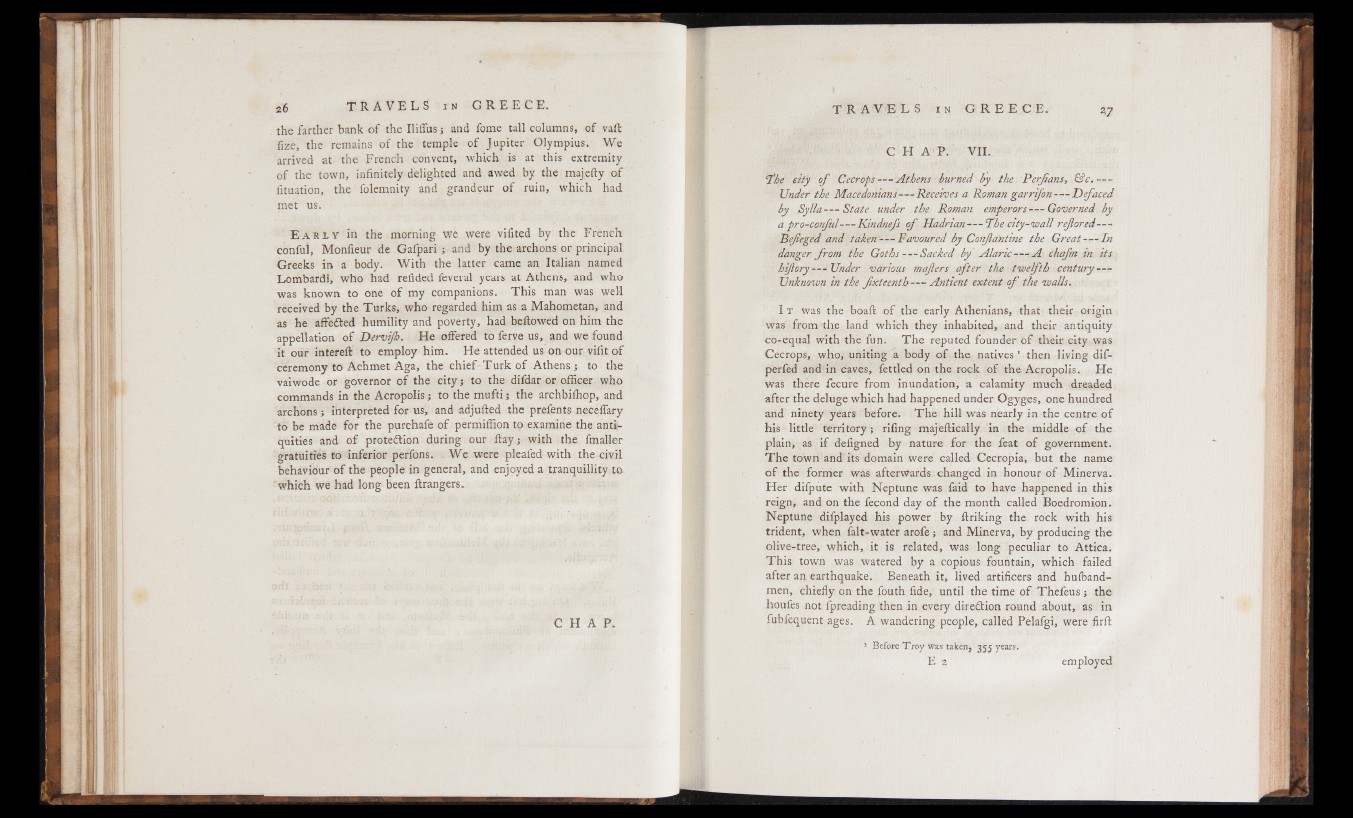
the farther bank of the Iliffus j and feme tall edltftnns, of vaft
fize, the remains of th e ? temple of; Jupiter Olympius. We
arrived at the FrenchednyenV -which' is ati; this extremity
o f the town, infinitely delighted and awed by the majefty of
iituaticin, the ’ folemnity and grandeur of ruin, which had
met us.
E a r l y in the»morning we were vifited by the French
cdnfui, Monfieur de Galpari ; and by the archons; or principal
Greeks in a body. With the latter came an Italian named
Lombardi, who had refided feveral years at Athens, and who
was known to one of-my-companions. * This man. was-well
received by the Turks, who regarded him. as a Mahometan, and
as he tfffe€fced huffiifity' and "poverty, had beftowed on him the
appellation q£ Dervifb. He offered to feryenis, and we found
i t our intereft to employ him. He attended us on- our vifit of
ceremony to Achmet Aga, the chief- Turk gf .Athens po t the
Valwode or governor g f the city j to the- difdar . or officer who
commands in the Acropolis; to the mufti'; the archbifhop, and
archbns'; interpreted for us, and adj>ufted the prefents .neceifary
1§91 mddo for the purchafe j of • permiffion-t|>. !gxaimn e-;the ant»-
qufties- anff #f protection’ during ;our^ff^5;r with the fmaier
gratuities to inferior perfons. - We were pleafsdwith the oiviL
behaviour’ of the people in general, and enjoyed a tranquillity-to
'which We had long Been ftrangers.
C H A P .
C H A' P . VII.
fthe eityvo f Cecrops—- Athens' ‘'burned by* the Perjians, ,,&c.
b lin d er1 the Macedonians—- Receives a Roman/ garrifon — Defaced
’ by Sylla— State under .tb fi Roman, emperors-^- Governed' by
a pro-conful- - -Kindnefs of. Hadrian — Phe eity-wall reftored—
Refeged andtaken--APavoured by Gohjlcttitine the G rea t---In
’ dtmger from the Goths —rSached-Pf Alaric^-r-.A chajin in its
'‘ hiftory-^Undev various maflers after the^iwelfth , century--*
XJnknowp in the fifteen th— Antient extent o f the walls.. • ;
I t -was the-boaft o f the early Athenians, that their origin
waSiftom 'the land which they inhabited^and theirfantiquity
^b-equal frith'the fun. E The reputed founder* o f 'thtif.fj:ity,w^s
Cecrops^ who; uniting a body of the natives,1 .then living dif-
perfed and1 in caves,’ fettled on the rock of the Acropolis. He
fra's there fecure frona inundation, a calamity much dreaded
tffter the deluge which had happened under;£%yges> omo hundred
and ninety7ydars before. -The hill .was nearly in the centre of
his1 little1*-Wtritory% rifing majfeftically in the j«®iddlenof ’ the.
plain; as if defigned by nature for. the feat o f government.
The town and its domain were called Cecropia, but the name
o f the former wa6 afterwards. changed in .honour o f Minerva..
Her difpute with Neptune was faid to have happened in this
reign, and og the fecond day o f the month called Boedromion.
Neptune difplayed his power by flriking the’ rock' with his
trident, when falt-water arofe; and Minerva, b y producing- the
olive-tree, which, it is related, was long lpeculiar to Attica.
This town was watered by a copious- fountain, which failed
after an. earthquake. Beneath it, lived artificers and hu(band-
men, chiefly on the fouth fide, until the time ofjThefeus; .the
houfes not fpreading 'then in .every direction round about, asI in
ffiblequent^ages. A wandering people, called Pelafgi, were fir ft
1 Before Troy was taken; I ^15 years.
e V employed.